Immigration issues dominated the first Republican presidential debate of the season, pitting GOP candidates against one another in addressing the millions of undocumented immigrants with firm roots in the United States.
Looming over the debate was real estate mogul and billionaire Donald Trump, who basked in his center podium placement on the debate stage, defying odds by leading national polls. Trump claimed credit for making immigration a major campaign issue after his now infamous speech announcing his candidacy in June, calling immigrants from Mexico drug dealers and rapists.
“If it weren’t for me, you wouldn’t even be talking about illegal immigration,” Trump said. “This was not a subject that was on anybody’s mind until I brought it up at my announcement.”
RELATED: The failed experiment of immigrant family detention
But even before Trump entered the race, any discussion of immigration issues has been a minefield for GOP candidates to navigate. Mitt Romney claimed only 27% of the Latino vote during the 2012 presidential race, putting Republican prospects in peril with the fastest growing voting bloc in the country. But in light of President Obama's series of executive actions offering a shield from deportation and temporary legal status to millions of undocumented immigrants, the swift Republican opposition to the measures was bound to make immigration a heavily contentious issue ahead of 2016.
A major sticking point distinguishing the candidates from one another is how they plan to address the estimated more than 11 million undocumented immigrants who currently live in the United States.
Former Florida Gov. Jeb Bush, who is fluent in Spanish, was put in the hot seat for steadfastly standing behind a pathway to legalization — notably not citizenship — with strings attached and in tandem with tightened enforcement along the border.
“There should be a path for earned legal status for those who are here,” Bush said. “Not amnesty — earned legal status.”
FOX News moderator Chris Wallace in fact called out Wisconsin Gov. Scott Walker for flip-flopping on his position after he previously supported a clear pathway to legalization, but later walked back by calling for limitation to even legal immigration.
Trump has been portrayed as a divisive figure on immigration — on Thursday he reiterated that he wanted the Mexican government to foot the bill for building a border wall. “We need to build a wall, and it has to be built quickly,” Trump said. “And I don’t mind having a big beautiful door in that wall so that people can come into this country legally.”
But it was Louisiana Gov. Bobby Jindal, the son of Indian immigrants, who used the most severe rhetoric against immigrants during his closing statements at the lower-tier candidate “kids table” forum held prior to the prime-time debate.
“We must insist on assimilation -- immigration without assimilation is an invasion,” Jindal said. We need to tell folks who want to come here, they need to come here legally. They need to learn English, adopt our values, roll up their sleeves and get to work.”
Texas Gov. Rick Perry has skirted around the issue on numerous occasions by insisting that illegal immigration at U.S.-Mexico border must be stopped entirely before lawmakers address the millions of people who have roots in the U.S.
“The border is still porous. Until we have a president of the United States that gets up and goes to the Oval Office with the intent purpose of securing the border,” Perry said.
